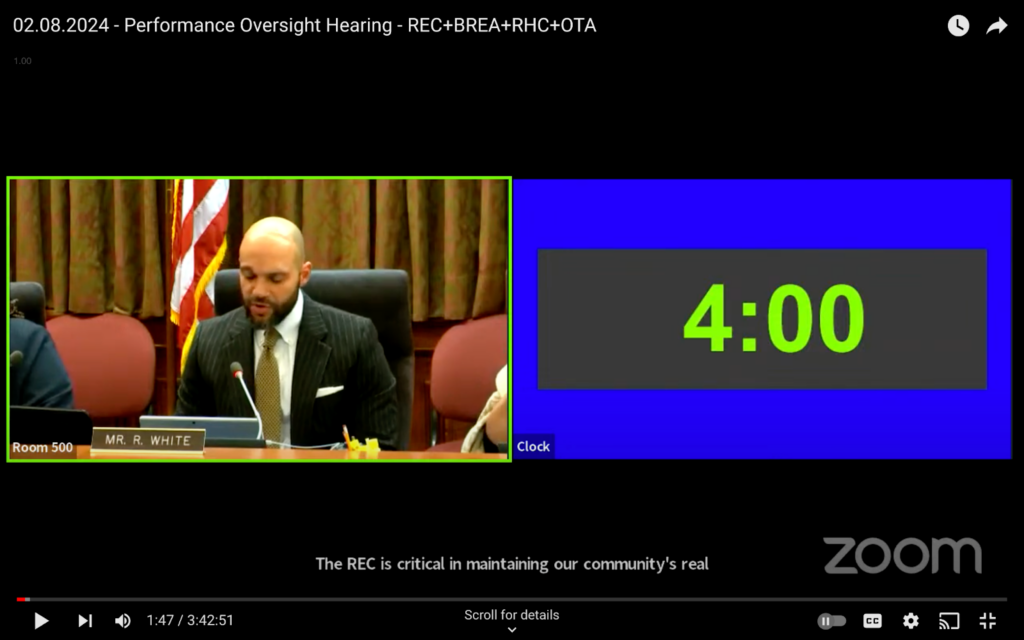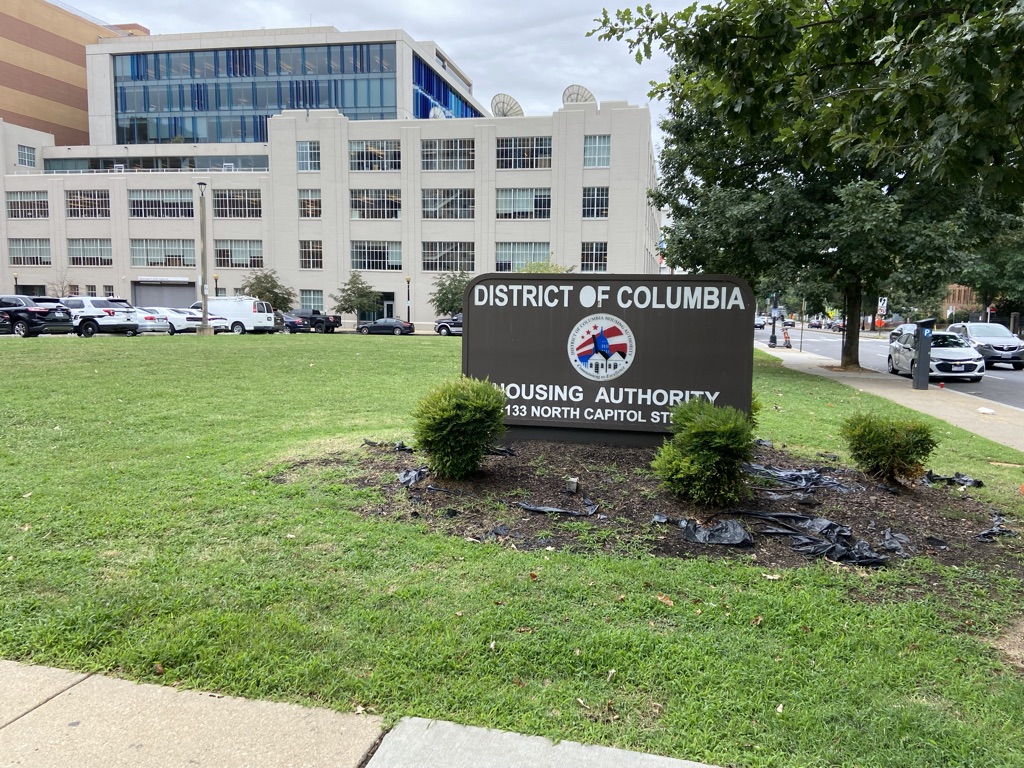In March, Ward 3 Councilmember Matt Frumin introduced the Rent Stabilization Protection Amendment Act of 2023. The bill, if passed, would make housing vouchers subject to D.C.’s rent stabilization law.
Rent stabilization laws limit the rent increases landlords can implement each year in apartment units built after 1976. But the regulations do not apply to landlords leasing to low-income tenants who rely on housing vouchers. As Street Sense has previously reported, this policy can incentivize some landlords to drive out existing tenants in rent-stabilized units in favor of people with vouchers to turn a profit.
Frumin, supported by some tenant organizations and the Office of the Tenant Advocate, argues this practice is unfair as it circumvents the intended purpose of both programs — to create affordable housing.
However, many housing providers testified against the bill at a June 29 hearing. Alex Rossello, director of policy communications at the Apartment and Office Building Association of Metropolitan Washington (AOBA), said the members of his organization worry the bill will make it more difficult for voucher holders to find a place to rent. Rossello contends that landlords incur more costs by renting to people who use housing vouchers. Because of the government’s involvement in the leasing process, landlords must endure longer wait times and navigate bureaucracy to rent to prospective tenants.
While there are some examples of “unscrupulous actors,” many landlords do not see vouchers as a way to profit, Rossello argued. He pointed to the fact the D.C. Housing Authority (DCHA) has already begun to reform how it sets voucher rents, and suggested D.C. wait to see what effect that has before passing further regulations.
The following conversation has been edited for length and clarity.
What problems led to the introduction of this bill?
Vouchers are a part of a very important program intended to provide housing for folks who’ve been formerly homeless. A key theory behind the program is to avoid concentrations of poverty, giving people a chance to have stable housing and get back on their feet. For the most part, the program is very successful.
But, we have one phenomenon where landlords in buildings that are subject to rent control believe they can circumvent the limitations of rent control by having voucher tenants whose rents are not subject to the rent stabilization limits. That provides an incentive to create new concentrations of poverty.
What is the goal of your bill in addressing these issues?
We don’t want to cannibalize all of our rent-stabilized housing stock through the voucher program, because that would be taking one form of affordable housing and displacing another. The structure needs to be adjusted so there isn’t so much of an incentive for landlords to go with a voucher tenant as opposed to a rent-stabilized tenant. It’s not that they shouldn’t go with a voucher tenant, but we shouldn’t incentivize the displacement of rent-stabilized units. So the goal here is to make this program work for everybody, for the tenants who are there on vouchers and for other folks. And, ultimately, the goal is not just to have voucher tenants in rent-stabilized buildings, but to make sure that we have voucher tenants in market buildings as well, so that we serve people fully but avoid concentrations of poverty.
On June 29, the council’s housing committee held a hearing about your bill. Broadly speaking, what was said at that hearing and what is the debate that’s going on?
When we first came out with the bill, we talked with advocates in the homeless services world and apartment owners and we had broad support from both groups. As we saw in the testimonies at the hearing, though, there’s a category of landlords who testified against the bill and are very concerned about its impact on the economics of projects they’re working on. We’re going to have those folks in to talk about the issues they raised and explore it more than you can at a hearing, where everybody only gets three minutes to speak.
That said, I think the hearing was very effective in bringing out the set of landlords who are most concerned. Some of them may be in the middle of a project based on the assumption that they would be able to get rents that were higher than the rent-stabilized rent, so they’re worried about that. Another thing that was raised was that there may be small multi-unit buildings where the rent-stabilized cost is much lower than the market rent cost. Some people worry about what the impact on those units would be.
On July 1, DCHA implemented a rent reasonableness measure that is supposed to limit cost inflation in units rented by voucher holders. Given this recent change and the solution it provides, why is your bill still important?
The structure of what DCHA proposed is that they will come up with reasonable rents by comparing costs in an area. But what’s a reasonable rent? Especially since the DCHA rubric doesn’t distinguish between rent stabilized and market costs. And so I’m not sure that that system is going to result in significantly lower rents under the rent reasonableness standard. And that’s a problem.
What my bill does is establish the distinction between rent stabilized and market and not to create one building that’s 100% or 60% voucher holders, but to have 10 buildings where there are some number of voucher residents.
Can you elaborate on the importance of not concentrating on voucher holders?
I think we all benefit from having diversity on social and economic metrics. It makes for a better world. It makes for greater understanding. And it creates more opportunity for people who have not enjoyed the privileges that I have. We can only create those opportunities by getting people under the same roof. We might be under the same roof and fight with each other, but we need to be under the same roof and communicate with each other in order to see each other in a healthier, helpful way. If you have one building that’s 100% low income people, you’re not getting that benefit, and you have a situation where that’s the building that other people in the neighborhood stay away from. And getting to know each other in constructive ways, it’s not easy and it’s not going to happen fast, but it’s sort of the only way to get to a different understanding of each other.
Why did you pose this bill? What is it about the work that you do that led you to fight for this issue?
The way in which the voucher program has operated in Ward 3 has created a fair amount of friction — I hear about it all the time. The majority of folks understand the importance of it and want to be supportive, but they see issues with it. One set of issues is this cannibalization of rent stabilization.
I also think I have been very active on affordable housing issues in Ward 3 for years. I believe that I have standing with folks who are deeply committed to serving the homeless community because of things that I’ve done for a decade and a half. And so I do think that I may have the capacity to bring people together around what I think of as sensible solutions. This is an enormously challenging space, but it’s one that I feel committed to trying to tackle and do right. When you do things right, people accept it and it sets you up to do more. We need to get to that point with the voucher program.
Looking forward, what’s the timeline for this bill and how optimistic are you about its passage?
The next step is a thing called markup, where we take on board whatever we heard in the hearing, make changes to the bill and then have it go through the committee where it’s voted on. So, right now I’m in the process of gathering information, thinking about what we learned from the hearing and what changes were suggested.
I’m hopeful that we’ll do that and then in the fall it will pass.
Annemarie Cuccia contributed to this article.








